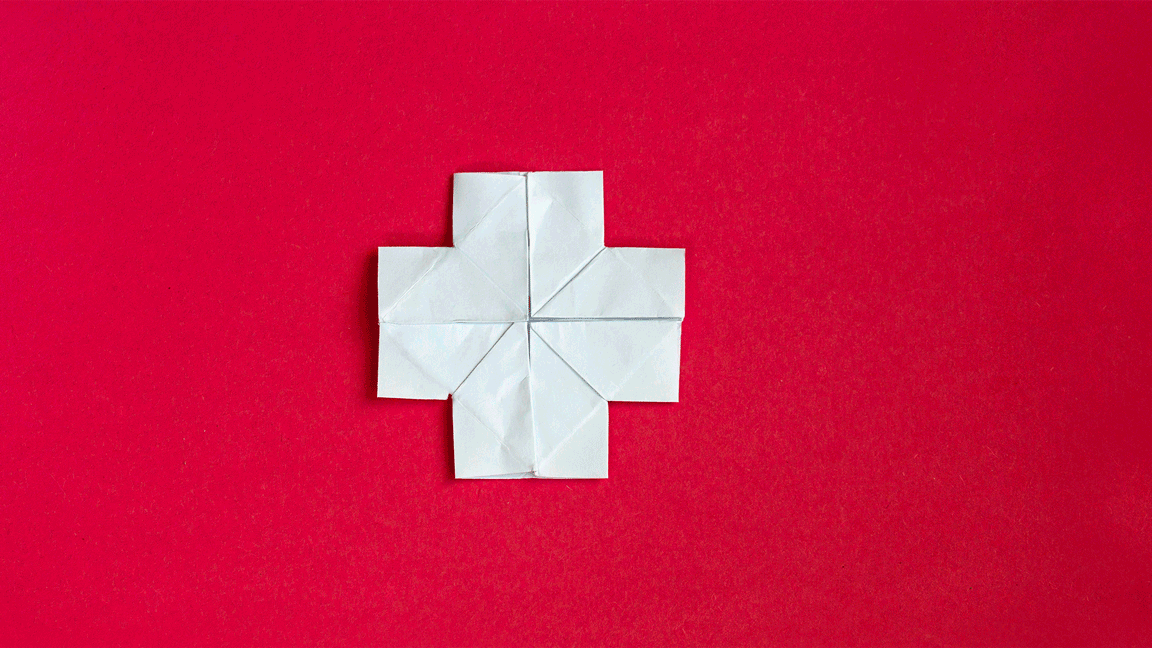- April 23, 2020
- By Maggie Haslam
Hospital wards inundated with COVID-19 patients have dominated news headlines, forcing cities to construct tents in parking lots, football stadiums, even cathedrals to handle the overflow. Yet even these temporary shelters require significant time and money to construct, at a time when both are in short supply.
Origami—the ancient Japanese paper art behind peace cranes and grade-school fortune tellers—might not seem like the obvious hero in such trying times, but architecture Assistant Professor Ming Hu was inspired by it to devise an accessible and affordable solution for hospital overflow, testing or disaster relief. The lightweight, portable design, which can effortlessly expand into a sturdy, temporary shelter capable of holding multiple people—both patients and clinicians—will be prototyped this summer by her students.
The proposed clinic was one of 11 University of Maryland projects to receive a Coronavirus Research Seed Fund Award this month from the Division of Research as part of UMD’s effort to address challenges surrounding the global COVID-19 pandemic.
“It’s truly an ingenious solution at a time when so many hospitals are scrambling for space to treat their patients,” said Donald Linebaugh, interim dean of the School of Architecture, Planning and Preservation. “I am thrilled that the university was able to recognize Ming’s innovation and commitment to solutions during this difficult time.”
The idea was born from an exercise she regularly employs in her “Structures II” class, where students are challenged to build origami designs that can bear weight. Her proposal will leverage the principles behind origami, but replace the rigid folding lines with flexible, hollow panels that, similar to springs, can store the kinetic energy needed to propel the tents expansion and collapse.
Like traditional origami, Hu’s design will rely on one of the most prolific, common materials available: paper. With the current offerings of temporary medical tents being cost-prohibitive for many developing countries and cash-strapped hot spots, a paper option is both easy to reproduce and affordable. It’s also a material Hu knows she can get her hands on right now.
“I can’t really do mass production or even 3D print with campus closed, but I can get paper,” she said. “Also, the mechanism of the self-assembly relies on folding and unfolding and how we turn that kinetic energy in different directions so that the structure itself can form. Paper is an ideal material.”
The project is slated to anchor a limited summer studio course, where Hu’s students will help fine-tune the prototype design. She has also discussed the idea with Donald Milton, M.D., a professor of environmental health with UMD’s School of Public Health and another grant recipient, as a viable space for testing to better safeguard the University of Maryland community. Milton’s project is a device designed to screen critical UMD staff for COVID-19 and identify if an individual is shedding the virus.
While much of Hu’s research and work centers on net-zero building systems and building performance, this project closely aligns with her innovative and creative work in building structures. It also stems from a desire to do something at a time when most people feel helpless. Originally from Shanghai, Hu has felt the profound impacts of the virus since early January, when COVID-19 was ravaging her home country.
“This is something that’s been on my mind for a long time,” she said. “When the call for proposals came out, I just felt that it was something that could be done.”
